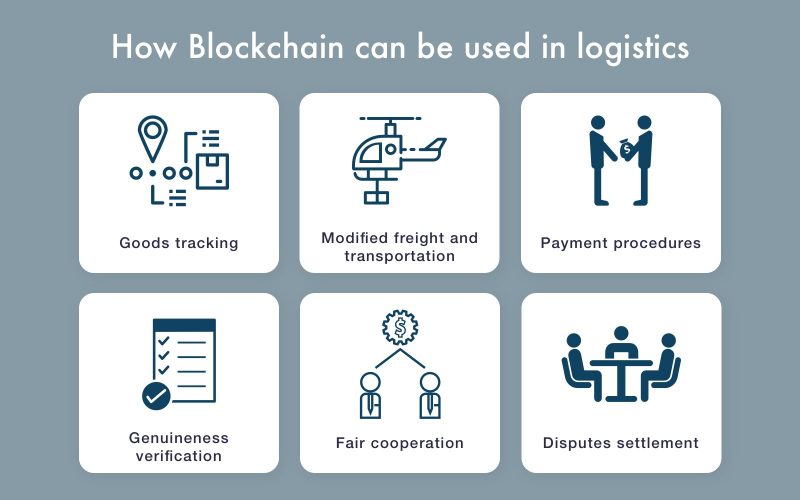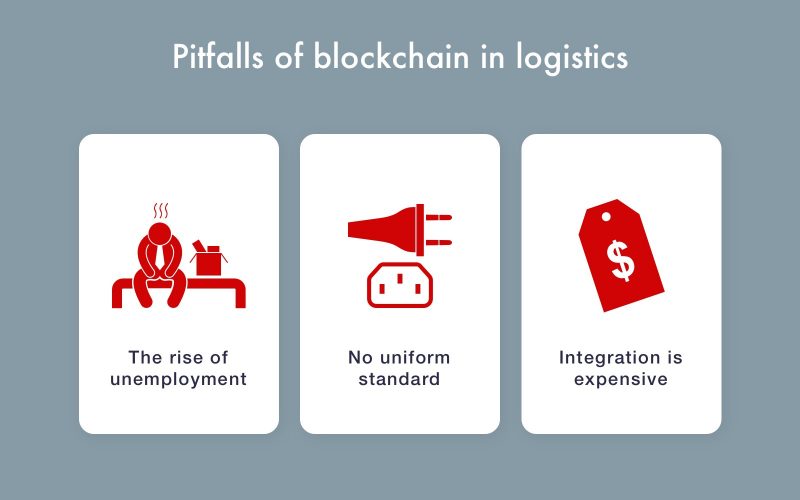Logistics and blockchain can be combined to make great improvements in the logistics field. Both carrier and receiver can get a lot of benefits from this synergy. This post explains what advantages does blockchain bring to logistics and how it can be implemented into the niche.
Advantage of blockchain in logistics
Before the goods get into end-users’ hands, they travel long distances and pass through a number of employees. A complicated route makes it hard for companies to ensure transparency in all processes and track all manipulations with the cargo. Companies often neglect detailed documentation related to containerization and delivery because it makes logistics expenses twice bigger.
How can blockchain help?
For a single transportation procedure, the company handles more than 200 documentation and goods related operations. They have to take care of signatures from various agencies, documents that confirm product origin, product composition, and other aspects.
Blockchain can significantly simplify these procedures. With blockchain, the supplier can create a packing list that will be available for all involved entities. Further, a smart contract is drawn up and sent to all required agencies. Besides, the information about the product is sent to the receiver to get their approval. Eventually, all documentation issues are handled simultaneously, and all parties can browse through the documents at any time.
This advantage speeds up the process drastically and saves a ton of resources. Blockchain-based logistics software development may become a revolution in the supply chain industry. It makes all transportation procedures faster, cheaper, helps to standardize all documentation issues, and allows a receiver to track their goods in real-time.
Main blockchain use cases in logistics
As you understand, blockchain makes all processes more efficient. That’s why entrepreneurs have found plenty of applications for this technology in the logistics niche. In this section, we’ve highlighted the ways how blockchain can be implemented and provided real-life examples.
Cargo tracking
Since all goods are tracked in the blockchain, it’s much easier to monitor the movement of cargo from the starting point to the final destination. Besides, in case if some goods were damaged during transportation, it’ll be easier to detect the stage where the incident occurred.
Walmart, in cooperation with IBM, integrated blockchain into transportation processes. Now they have more. Now, Employees can scan any good from their network and detect where it’s stored and where it came from. This solution simplified employees’ workflow and made the overall process of goods tracking more effective.
Effective cargo transportation
As stated before, the transportation can be simplified due to the smaller number of documents required for the operation. Blockchain reduces financial expenses on paperwork and significantly reduces the number of human errors.
Invoices and payments
Distributed technologies grant far more security to financial operations than conventional payment methods. With the help of cryptocurrencies like Bitcoin, Litecoin, Ethereum, and so on, payment procedures become secure and eliminate the chance of interventions. Besides, blockchain contracts can be customized according to parties’ personal requirements without time burdens.
Authenticity verification
With the help of transparent contracts, end-users will be able to check the genuineness of the goods they’re going to receive. Blockchain solutions provide the verifying documents about the product place of origin, composition, quantity, and more. That’s how receivers can get detailed and verified information about the delivery before they actually get it.
Payments distribution
Blockchain helps to distribute payments between companies fairly according to their size. During the delivery process, it’s often useful to hire several intermediary companies to fulfill transportation-related issues. Blockchain-based software divides the budget according to the company’s size, so every business partner will receive a fair reward.
Disputes Management
The transportation process may be unpredictable and take more time than it should. No wonder that disputes between customers and carriers may occur. In case if the cargo was damaged, lost, or even delivered outside the time frames, there’s no need to involve lawyers to solve disputes. With blockchain, both parties can track the state of the delivery at any time, define where the problem occurred, and prosecute those responsible for the issue.
Pitfalls of blockchain in logistics
Even though distributed technologies bring a number of benefits to this niche, everything has its price. We strongly believe that these issues will be solved in the future, but for now, we have to accept them the way they are.
Cost of Integration
Despite the fact that blockchain systems help owners save a lot of money, they still require a significant initial investment. Without mentioning a cost for software development, you’ll have to shell out for high-performance hardware. On top of that, the company will need several blockchain specialists that will maintain the software. If you can’t find a proper employee, you;ll have to train them from the ground up. This process also requires time and money.
The rising level of unemployment
The downsizing of your staff may seem an advantage at first glance, but it leads to serious problems on a global level. A decrease of the human workforce without providing additional workplaces in the logistics sector can lead to an increased unemployment rate and may hit the world economy.
Standardized business processes
To successfully implement blockchain solutions in the logistics field, there should be a uniform standard. Unfortunately, we don’t have one for today. The government should take care of standardization on the level of legal terms. The absence of a uniform standard may lead to confusion between international companies, inaccuracies in smart contracts, and even serious data leaks. That’s why it’s crucial to adhere to governmental standards.
Wrapping Up
To sum up, you can see that distributed technologies can significantly boost transportation operations and the logistics sector in general.The reduction of paperwork, advanced goods tracking systems, and convenient management of invoices helps entrepreneurs cut their operational expenses and make their employees more productive. Despite all the pitfalls of blockchain in logistics, it’s still a very promising technology. However, to come up with truly worthwhile software, you should find an experienced software development company.






